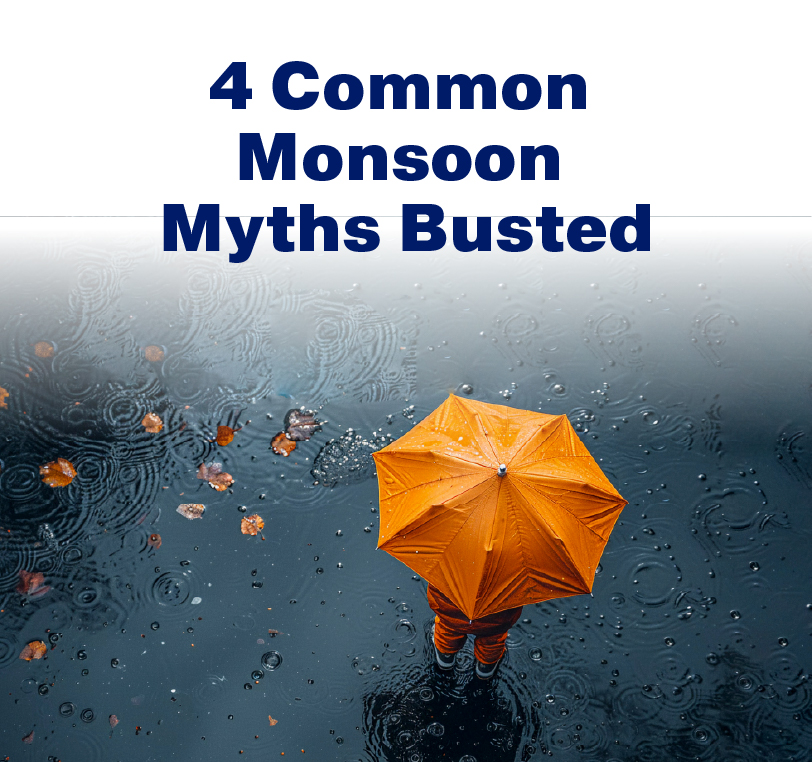4 Common Monsoon Health Myths
4 Common Monsoon Myths Busted
The arrival of the rainy season is always a relief from the summer heat, but it also brings a surge in seasonal illnesses, especially urinary tract infections (UTIs), digestive troubles, and fevers. While it’s easy to blame the weather, most monsoon-related illnesses have more to do with compromised hygiene, unsafe food, and ignoring early symptoms than with the rain itself. Let’s separate common myths from the real facts to help you stay healthy this season.
Myth 1: Getting Wet in the Rain Makes You Sick
Fact:
Catching a cold isn’t about getting drenched. The real problem comes from staying in damp clothes, which can lower your immunity and encourage bacteria to multiply on your skin. Sudden drops in temperature and neglected personal hygiene play a bigger role in triggering infections than rainwater does.
Myth 2: You Don’t Need to Drink Much Water During Monsoon
Fact:
Just because it’s cooler doesn’t mean you should cut back on water. Your body continues to sweat, and your kidneys work just as hard. Skipping fluids causes urine to become concentrated, raising your risk of UTIs. Dehydration also lowers immunity, making you more prone to infections.
Myth 3: Eating Curd, Fish, or Mangoes Leads to Cold and Infections
Fact:
Food does not cause infections by itself. The real culprits are poor storage and hygiene. Spoiled curd, undercooked fish, or unripe mangoes or cut with unclean tools can harbour harmful bacteria that upset your stomach and make you sick.
Myth 4: It’s Okay to Hold in Urine Longer During the Rains
Fact:
Many people postpone bathroom breaks in wet weather or when travelling. This habit, especially when combined with reduced water intake, creates the perfect setting for bacteria to grow in the urinary tract, increasing the chances of silent, severe UTIs (Urinary Tract Infections).
Warning Signs: You Should Never Ignore
For UTIs (Urinary Tract Infections)
· Burning sensation when urinating
· Lower abdominal pain or heaviness
· Needing to urinate frequently, even after just going
· Cloudy or foul-smelling urine
For Gastric or General Infections
· Sudden tiredness or weakness
· Loss of Appetite
· Nausea or Bloating
· Loose Motions or Stomach Cramps
· Unexplained Fever
If you experience high fever, severe abdominal pain, persistent vomiting, dehydration, confusion, or blood in urine or stool, seek immediate medical attention or consult your family physician.
Recommended Tests for Monsoon-Related Diseases (If Symptoms Last More Than 48 Hours)
If your symptoms don’t improve within two days or get worse, it’s important to consult a doctor and get the following tests, which help pinpoint the exact cause and lead to the right course of treatment:
|
Test Name
|
What It Checks For
|
When to Consider
|
|
CBC (Complete Blood Count)
|
Measures white blood cells, flags general infections.
|
Persistent fever
|
|
Urine Culture & Sensitivity
|
Identifies the exact bacteria and the best antibiotics
|
Severe or recurrent UTIs
|
|
Urine Routine & Microscopy
|
Finds pus cells and bacteria (infection or inflammation in urine)
|
UTI symptoms
|
|
Kidney Function Test
|
Evaluates kidney health, checks for complications
|
Severe or recurring UTIs
|
|
Stool Routine & Culture
|
Detects bacteria or parasites in stool
|
Diarrhoea or stomach symptoms
|
|
Widal Test
|
Diagnose typhoid infection
|
Ongoing high fever
|
|
LFT (Liver Function Test)
|
Assesses liver health, possible hepatitis
|
Jaundice or liver symptoms
|
|
CRP Test
|
Shows presence of serious inflammation or infection
|
Unexplained fever
|
Early testing gives you and your doctor a head start, leading to a quicker recovery and fewer complications down the line.
Smart Tips to Stay Safe This Monsoon
· Do not hold your urine for long periods. Use clean toilets whenever needed.
· Drink at least 2–3 litres of purified water every day.
· Avoid raw or street food and toss out leftovers that look or smell off.
· Always wash your hands thoroughly before eating.
· Maintain personal hygiene and make sure clothes are dry after getting wet.
The Bottom Line
Illness during the monsoon is not simply “because of the weather.” Most health problems can be prevented through good hygiene, safe eating habits, and paying attention to early warning signs. Do not downplay symptoms, and do not delay testing if you feel sick for more than two days. Acting early, drinking enough water, and maintaining cleanliness can keep you healthier and help you enjoy the rainy season without worries.
